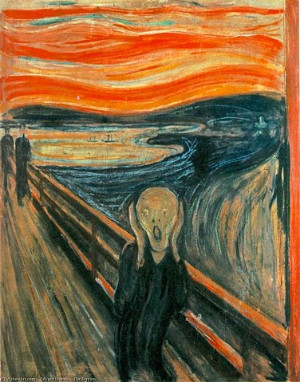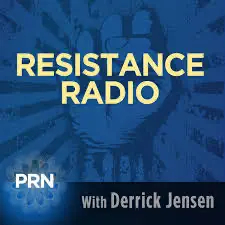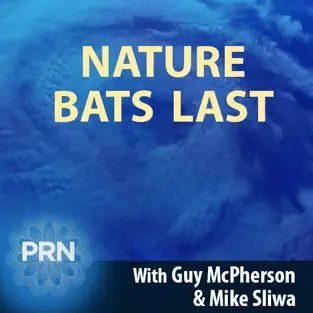Image: The Scream of Nature by Edvard Munch CC0
“Having a conscience now is a grief-soaked proposition” – Stephen Jenkinson, author of Come of Age: The Case for Elderhood in a Time of Trouble
“We are the first generations to grow up surrounded by evidence that our attempt to separate ourselves from ‘nature’ has been a grim failure, proof not of our genius but our hubris.”
“The greatest challenge we face is a philosophical one: understanding that this civilization is already dead. The sooner we confront our situation and realize that there is nothing we can do to save ourselves, the sooner we can get down to the difficult task of adapting, with mortal humility, to our new reality.” –
A few years ago I saw my first glacier. I was on a trip to Alaska with my family before my father died and he had always dreamed of seeing the region; so we were happy we could do this one last trip to fulfill it for him. We cruised through the Inside Passage past glimmering mountains of cerulean blue ice, drove through part of the Yukon Territory of Canada by turquoise lakes, and hiked close to a receding glacier. It was breathtaking, yet throughout the journey a specter of sorrow accompanied me.
In the West we are conditioned to chase those specters away. Grief itself is often viewed as something unnatural, as some kind of disorder to be dealt with by silencing ourselves, ignoring it or medicating it to numbness. We often hear well-meaning people suggest to the bereaved that they “keep themselves busy.” If our grief lingers, we are told that we are “depressed” or “not coping well” or that we need “closure.”
But like many others I have found myself encountering a grief that envelops my entire being more and more. An existential grief that cannot ignore our collective predicament as a species and that often accompanies a sense of panic and powerlessness. And I have begun to relate even more to Edvard Munch’s iconic painting “The Scream.” It seems to me to be the perfect emblem of our times, an unheard anthem of despair silenced by the absurdity of an omnicidal status quo. And so many of us feel that sense of terrorized paralyzation at the madness of rising militarism, fascism and brutality and an unfolding ecocidal nightmare. But so often we feel confined to an interior space that our culture has consigned us to.
Today we are bombarded with distraction. Our brains are flooded with carefully programmed and meticulously marketed algorithms that condition us to respond to screens rather than each other and the living planet. The dominant economic order robs us of our feelings, thoughts and even our grief and transforms them into capital and commodities for sale. Indeed, it is incapable of doing anything else. But many ancient traditions grappled with grief in a public way that was not exploitative.
Years ago, in Europe and in the Americas, those who were mourning the death of a loved one announced their grief to others by wearing a piece of black cloth around their arm or by placing a black wreath upon their front doors. Many indigenous cultures have elaborate rituals to mark the death of loved ones and the passage of bereavement. In the small fishing and farming community where my mother grew up every able bodied person was expected to follow the casket up to the cemetery in a solemn procession. And these public expressions of private grief provided a bridge of solidarity and community.
Now many of these traditions have been rejected or forgotten. They are vestiges buried by modernity; and in their absence a deep sense of alienation has grown. Facing our grief can be transformative. It can foster empathy and has the power to galvanize people to action. It cannot alter the past. It does not have the power to halt climate feedback loops or predict and prevent tipping points. And it cannot stop a looming biospheric and societal chaos that is all but locked into the system. But it can strengthen the pysche, offer us an insight into resilience, and give us the tools we need to resist the inhumanity that accompanies collapse. It can also help us appreciate and protect what remains.
I remember pouring over wildlife books when I was a boy, always dreaming of exploring their exotic locations in person one day. The natural world was at once terrifying and abundantly rich with mystery and wonder. Of course in those days I never thought I might witness its end. I never considered that the Great Barrier Reef and scores of other coral reefs around the world would succumb to a bleached death. I never thought that the Arctic Ocean would be ice free, or that it would rain in Greenland in winter, or that gigantic nation-sized shelves of ice would simply break off and fall into the sea in Antarctica. I never imagined the Amazon Rain forest would suffer from catastrophic fires every year, or that 40% of wildlife would be sponged away from the living earth, or that plastic in the seas would be so ubiquitous that a bag would be found in the deepest part of the ocean, the Marianas Trench. Now, decades later, I have witnessed all of that and more. This is the reality of the Anthropocene, so with all of this it becomes impossible at some point for any rational human being of conscience not to grieve.
But on that trip years ago I had the opportunity to meet grief face to face. I stood alongside my father in silent reverence at the nature before us. At the time I could not have known that he would not be with me on this earth much longer. Perhaps some other sense did. Standing on the deck of the boat, passing under great mountains of melting ice, I felt that sense of awe that a child does. I also felt immensely small. My heart beat hard in my chest as I attempted to comprehend what my species and, in particular, my society has done to this precious life giving earth. I felt the cold air from that melting glacier roll over me. But this time I decided to not chase that specter of sorrow away. For a brief moment I wouldn’t view him as an adversary, but as a companion. So I embraced him like a long lost friend and he smiled at me and said, “What took you so long?”
Kenn Orphan is an artist, writer, radical nature lover, weary but committed activist and hospice social worker. The intent of his blog is to bear witness to the dire events unfolding around us without any pretense of false hope; and to share insights and reflections through the transformative lens of solidarity. He writes about art and culture, socio-economic injustice, geopolitical issues and the existential threats we collectively face from corporate capitalism, the war industry, climate change and an ever imperiled biosphere. His work focuses on the desperate need for a global paradigm shift that fosters compassion for and solidarity with the suffering of humanity and the countless other species with whom we share this precious planet. kennorphan.com




